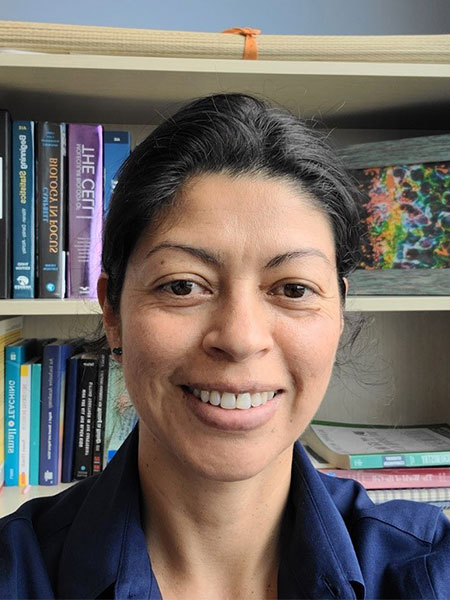Dr. Elda Rueda

Biography
Dr. Rueda is a cellular biologist and neurobiologist. In her research she employs a combination of mouse gene targeting and developmental genetic approaches to study the biochemical and molecular mechanisms that control the metabolism and stemness of retinal cells. Dr. Rueda teaches multiple courses at UHD while mentoring undergraduate students in her laboratory. She collaborates with faculty from Baylor College of Medicine (BCM) to engaged students in a variety of experimental approaches such as mouse gene knockout and transgenesis, histology, microscopy, and bioimaging analysis which are frequently utilized in studying the pathophysiology of models of human disease.
Degrees Earned
Bachelor of Science, Chemistry with emphasis in Biochemistry, University of Houston-Downtown
Doctor of Philosophy, Vision Science & Physiological Optics, University of Houston-College of Optometry
Courses Taught
BIOL 1301- General Biology I
CHEM 4340- General Biochemistry I
CHEM 4342- General Biochemistry II
CHEM/BIOL 4344- Principals of Pharmacology and Toxicology
BIOL 4311- Senior Seminar Course in Stem Cell Biology
Experience Qualifications
Assistant Professor of Biology & Chemistry: 2021-present
Adjunct Researcher, Baylor College of Medicine-Integrative Physiology: 2021-Present
Postdoctoral Associate, Baylor College of Medicine: 2016-2021
Adjunct Instructor, University of Houston-Downtown: 2018-2021
Teaching Assistant of Anatomy Lab, University of Houston-College of Optometry: 2011-2016
More Information
Rueda E.M., Poche R.A. (2022) Elucidating the Role of the Electron Transport Chein in Retinal Progenitor Cells and Neuro-regeneration. The FASEB Journal 36, S1R5448.
Ambekar Y.S., Singh M., Rueda E.M., Hall B.M., Scarcelli G., Poché R.A., and Larin K.V. (2020). Characterization of retinal Biomechanical properties using Brillouin microscopy. Journal of Biomedical Optics 25. 090502-1-7
Rueda E.M., Hall B.M., Tong X., Martin J.F., and Poche R.A. (2019). The Hippo Pathway Blocks Mammalian Retinal Müller Glial Cell Reprogramming. Cell Rep 27, 1637-1649.
Poche R.A., Zhang, M., Rueda E.M., Tong, X., McElwee, M.L., Wong, L., Hsu, C.W., Dejosez, M., Burns, A.R., Fox, D.A.,Martin, J.F., Zwaka, T.P., and Dickinson, M.E. (2016). RONIN Is an Essential Transcriptional Regulator of Genes Required for Mitochondrial Function in the Developing Retina. Cell Rep 14, 1684-1697.
Rueda E.M., Johnson, J.E., Jr., Giddabasappa, A., Swaroop, A., Brooks, M.J., Sigel, I., Chaney, S.Y., and Fox, D.A. (2016). The cellular and compartmental profile of mouse retinal glycolysis, tricarboxylic acid cycle, oxidative phosphorylation, and ~P transferring kinases. Mol Vis 22, 847-885.
Chaney S.Y., Mukjeerjee S., Giddabasappa A., Rueda E.M., Hamilton R.W., Johnson J.E., Fox D.A (2016). Increased Proliferation of Late-Born Retinal Progenitor Cells by Gestational Lead Exposure Delays Rod and Bipolar Cell Differentiation. Mol Vis 22, 1468-1489.
Fox D.A., Rueda E.M. (2015). Photoreceptor Mitochondrial Reserve Capacity: Is It the Etiology for Differential Compartmental Vulnerability? Invest Ophthalmol Vis Sci 56, 8437
